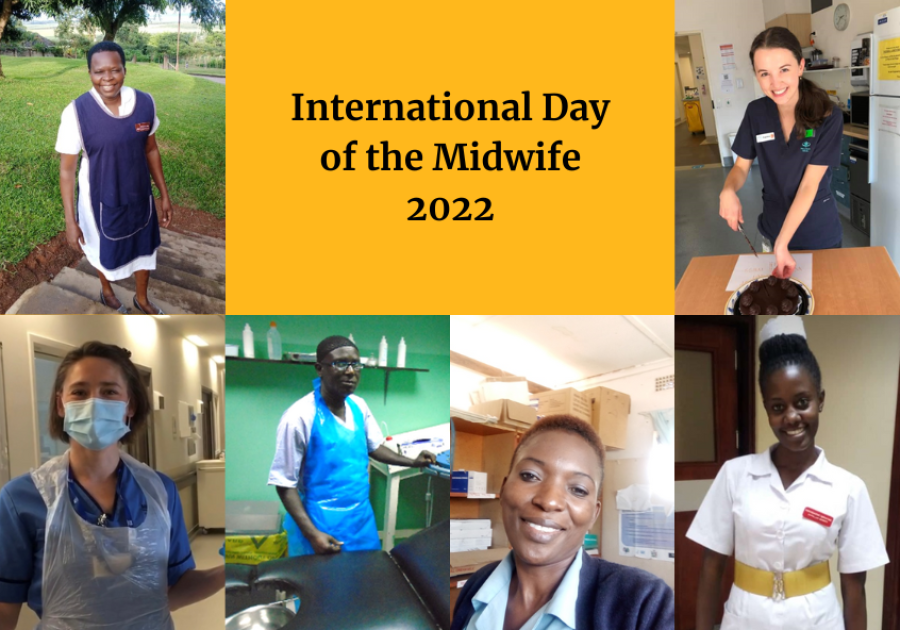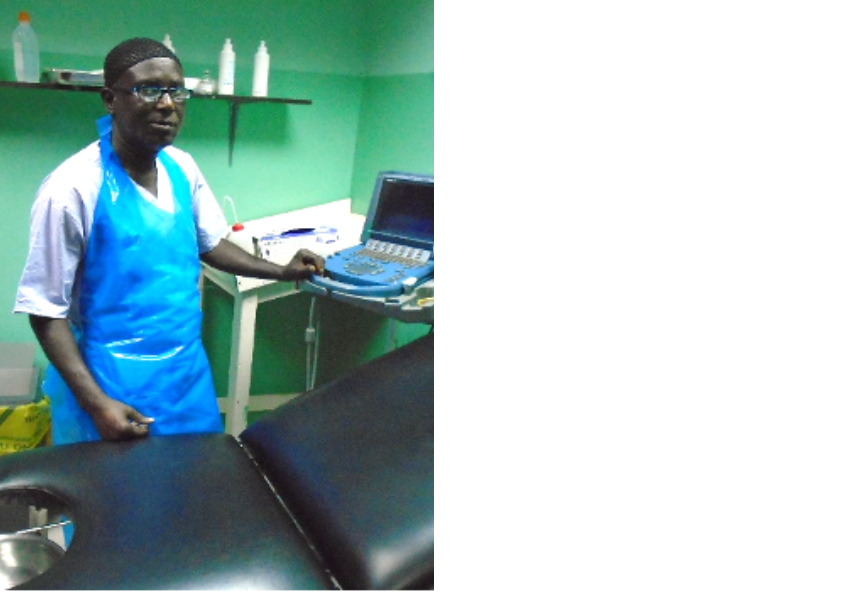
Susan Amongi, Midwife, Uganda
Susan has been providing care as a midwife in Uganda for over 25 years. She is currently part of the MRC/UVRI and LSHTM Uganda Research Unit and is working on a clinical trial evaluating the efficacy and safety of vaccines against mycobacterium tuberculosis infection in newborn infants.
Over the years, Susan has encountered several barriers that hinder her work. Inadequate medical supplies and a lack of equipment is a challenge, particularly in resource limited communities where medical necessities are scarce. Poor referral systems are also a problem.
Susan said: “A mother may present with a complication, or develop a complication during labour, and there are no ambulances or available ambulances with no fuel. This puts the life of both mother and baby at risk.”
During the Covid-19 pandemic, the local referral hospital in Entebbe was closed to cater for Covid-19 patients only. This additional challenge greatly affected the community where Susan works as pregnant women and new mothers were unable to afford the expensive private alternatives and had to travel further to reach the services they required.
Despite these challenges, Susan enjoys her work. She said: “I love my profession as a midwife, attending to mothers during pregnancy, labour and puerperium and ensuring a clean safe delivery in order to reduce maternal and newborn deaths. If our government could improve on these challenges in the future, midwifery would be so amazing, then midwives can handle every situation at hand without challenges.”
Harriet Ruysen, Midwife, UK
Harriet is a Research Fellow at LSHTM. She is part of a team working in support of the Every Newborn Action Plan which aims to prevent newborn deaths and stillbirths. She is also on the midwifery bank for the Dumfries and Galloway Royal Infirmary in Scotland where she provides intrapartum, emergency and postnatal care for women and newborns.
During the last decade, Harriet’s work has mainly focused on improving equitable access to quality maternity care in low resource and conflict settings.
She said: “Every year, more than 4.5 million preventable deaths of women and babies occur during pregnancy and around the time of birth globally. Progress for these women and babies remains too slow with major gaps in coverage of high-quality maternity care. Midwife-led continuity of care can increase reported satisfaction by women, and reduce the risk of newborn death, pre-term birth, and episiotomy, but current estimates show there is a global shortage of about 900,000 midwives, with the biggest gaps in Africa.
“We need more midwives everywhere around the world, including in the UK; and midwives need an enabling work environment that supports life-long learning, inter-disciplinary teamwork, instituted case review and feed-back mechanisms, and safe staffing levels.
“Painful learning from the recent UK based Ockenden Report (2022) clearly demonstrates this, and the importance of promoting shared systems of accountability and leadership for maternity care. I hope we will see more support for midwives and the whole team of frontline workers caring for women and their families as they plan for a new baby, and throughout their pregnancy, birth and beyond, irrespective of where in the world we are working.”
Edrisa Sinjanka, Midwive, The Gambia
Edrisa is a practicing midwife as well as a Nurse Field Coordinator at the MRC Unit The Gambia at LSHTM. He has been working as a midwife since 1998 and currently works at the Maternity Unit in Keneba Field Station.
Edrisa said: “Being a midwife is something I’ve always been passionate about and my long years of experience only continues to give me joy. I find pleasure in serving the interests of women in labour and successfully putting smiles on their faces.
“However, the profession doesn’t come without challenges and one of the major challenges I face as a midwife is time constraints due to limited staffing. I personally must spend long hours in the delivery room conducting deliveries alongside other clinical duties.
“The effects of the Covid-19 pandemic cannot be overlooked either as it has brought significant changes in my career. The issue of under-staffing has become more prominent making our jobs quite hectic with lots of new protocols to be strictly followed to combat the pandemic.
“Nevertheless, I remain passionate and driven. Appropriate staffing, professional capacity building, and provision of adequate equipment are key in enhancing our jobs as midwives so must be given due consideration. Personally, I envision a world where midwives are motivated to carry on their responsibilities and further encouraged to actively participate in research and publications both nationally and internationally. Motivated midwives operating within conducive working environments is the way forward for efficient maternal deliveries.”
Francesca Sadler, Midwife, Australia
Frankie is a nurse and midwife from Australia who is studying our MSc Public Health. Before joining LSHTM, she worked in one of Melbourne’s largest hospitals for three years, covering several different areas of maternity care.
Victoria, Australia, experienced a baby boom as a consequence of the Covid-19 lockdowns and this resulted in an incredible strain on maternity services in the area. Frankie said: “Being faced with this as a more junior midwife was challenging, as it required me to step up and take on more than would have been expected of me in different circumstances. Despite these challenges it was a privilege to support women at such a vulnerable and exciting moment in their lives, amidst such uncertainty. My hope is that going forward, governments will prioritise women’s health care and act quickly to support the professionals delivering these services, especially in times of crisis - because the future is quite literally in their hands.”
Christine Kukundakwe, Midwife, Uganda
Christine has been a midwife in Uganda for nine years. She obtained her diploma in midwifery from Mulago School of Nursing and Midwifery, Kampala, and is currently employed as a midwife and research nurse at the MRC/UVRI and LSHTM Uganda Research Unit.
Christine hopes that one day she will be able to learn how to conduct a caesarean section so that she can help women experiencing obstructed labour. She said: “It is a very big challenge seeing a pregnant mother in pain when I can’t help, for example seeing a mother in obstructed labour and having to wait for the doctor to come and do a caesarean section. To make my role easier, more enjoyable and to save the lives of mothers giving birth, I hope one day midwives can learn how to do a caesarean section and help in complicated cases like these. I am proud to be a midwife, to love and serve for God and my country.”
Kasiku Mkwati Nkonde, Midwife, Zambia
Kasiku has been working as a midwife in Zambia since 2010. She currently works at Maramba Urban Health Centre, coordinating the maternal and child health department and is part of the Zipime Weka Schista study team working for the joint diagnosis of female genital schistosomiasis and cervical cancer.
Alongside a shortage of staff and equipment, Kasiku faces the challenge of poor infrastructure and a lack of specialised care for paediatrics where she works. Since the Covid-19 pandemic began, expectant mothers have avoided attending the health centre for their antenatal appointments which puts their health at risk.
Despite the challenges, Kasiku enjoys her work. She said: “As a midwife you care for a life from conception until the child is 5 years of age. My role as a midwife is made easier with good communication and more enjoyable with the involvement of the community to achieve our goals.”
Our postgraduate taught courses provide health practitioners, clinicians, policy-makers, scientists and recent graduates with a world-class qualification in public and global health.
If you are coming to LSHTM to study a distance learning programme (PG Cert, PG Dip, MSc or individual modules) starting in 2024, you may be eligible for a 5% discount on your tuition fees.
These fee reduction schemes are available for a limited time only.






